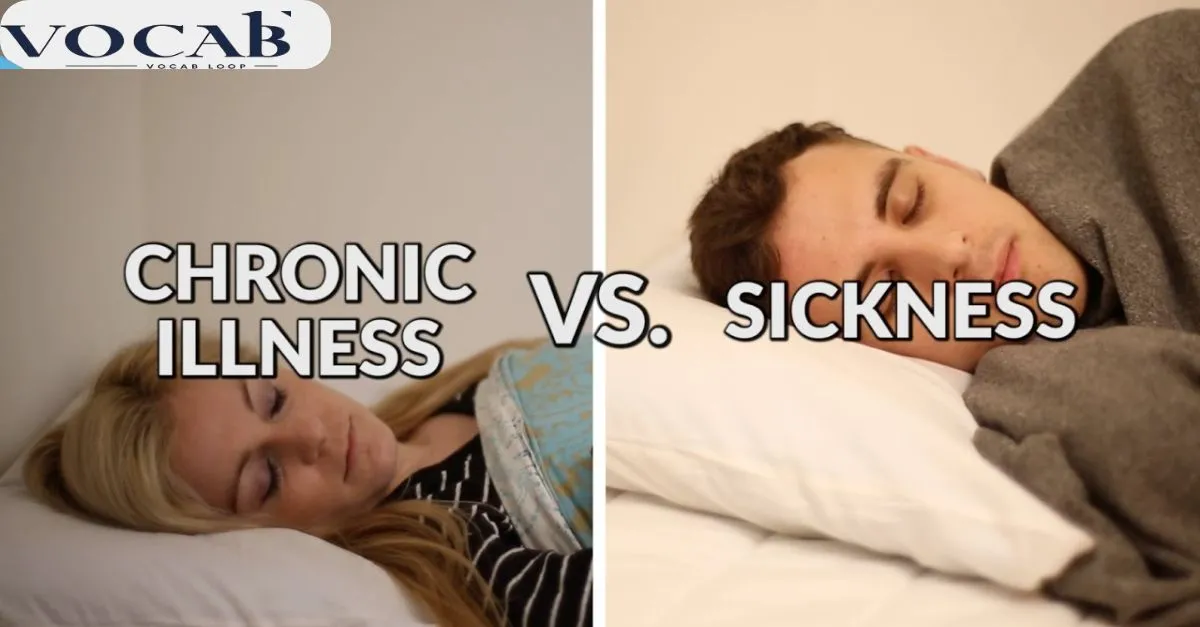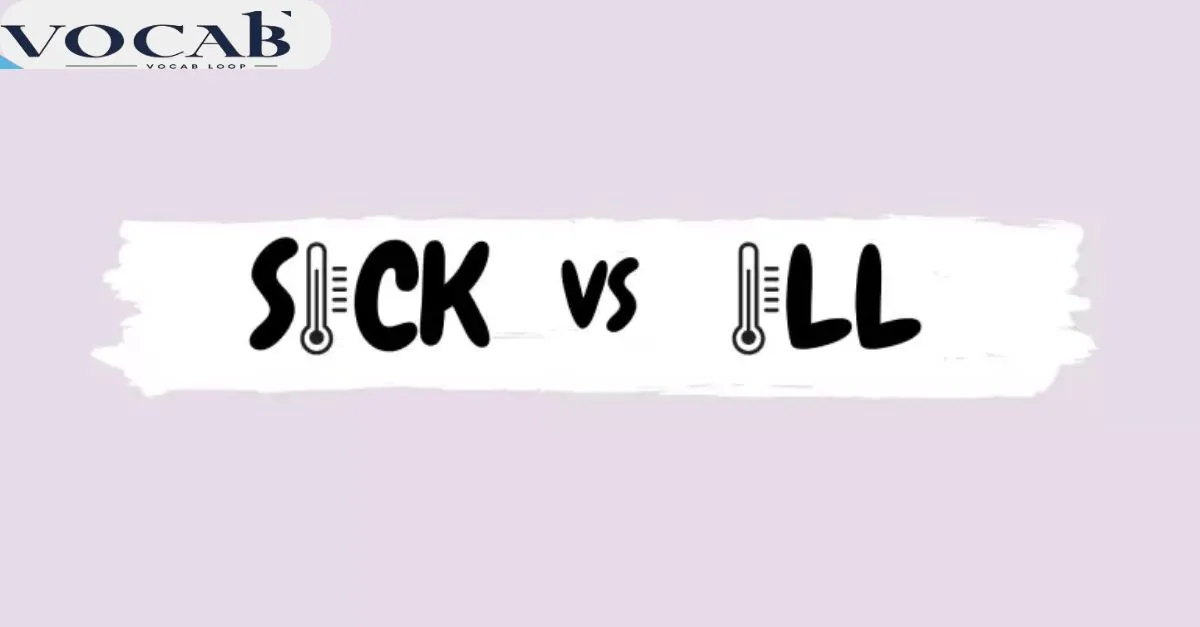The words “sick” vs “ill” are often used interchangeably, but they have subtle differences that depend on health contexts, cultural preferences, and the tone of conversation. Both terms describe someone’s state of health, yet their usage varies between casual conversations and formal contexts. In American English, “sick” is more common in everyday dialogue, while British English leans toward “ill,” especially in professional or serious situations.
Understanding these differences is crucial for mastering health vocabulary and avoiding word confusions. This article dives deep into the nuances of “sick” and “ill,” exploring their definitions, meanings, and usage in both formal and informal settings. By the end, you’ll have clarity on these commonly confused words and practical tips to use them correctly.
What Is the Confusion Between Sick vs Ill?

The main confusion between “sick” and “ill” arises because both describe a person who is unwell. However, their tone and usage differ significantly. For instance, Americans commonly say, “I feel sick,” to describe temporary conditions like nausea or a headache. On the other hand, British speakers are more likely to use “ill” to describe severe conditions or long-term health issues, such as chronic diseases or hospitalizations.
Adding to the complexity, these terms can also describe emotional states or metaphoric situations. For example, “I’m sick of this” expresses annoyance, while “ill feelings” imply emotional discomfort. These similar expressions create confusion for learners of English and make understanding their distinct meanings all the more important.
Who Is Sick vs Ill?

When describing someone as “sick,” it generally refers to short-term illnesses or passing sicknesses. For instance, someone might say, “I was sick with the flu last week,” to describe a transient ailment. This term is especially popular in American English for everyday, informal situations. It’s also frequently used to describe nausea, such as in “I feel sick to my stomach.”
In contrast, “ill” conveys a more serious tone. It’s often used to describe long-term health issues or persistent ailments, such as cancer or severe infections. For example, “He has been ill for months” suggests a condition that requires medical attention or prolonged recovery. In professional settings, “ill” is the preferred term, especially in medical reports or formal writing.
Is the Word Sick Correct?

Definition
“Sick” is a term that refers to a state of being unwell, either physically or emotionally. It often describes conditions that are temporary or mild, such as a cold, fever, or nausea.
Meaning
The word “sick” primarily refers to temporary health problems or feelings of discomfort. It’s widely used in casual speech and can also have metaphorical meanings, like “I’m sick of waiting,” which expresses frustration or irritation.
Usage
In informal settings, “sick” is the go-to word in American English. People commonly use it to describe short-term illnesses, such as in “I feel sick today.” Additionally, it’s used in phrases like “sick leave” for workplace absences due to health challenges. The word is versatile, fitting both literal and figurative expressions.
Is the Word Ill Correct?

Definition
The word “ill” refers to a state of being unwell, often implying something serious or long-term. It is considered more formal and is frequently used in medical or professional contexts.
Meaning
“Ill” typically describes severe health issues or ongoing diseases that require medical attention. Beyond physical conditions, it can also reflect emotional states, such as in phrases like “ill will” or “ill feelings,” which describe negativity or animosity.
Usage
“Ill” is more common in formal descriptions or official discussions, particularly in British English. For example, “She has been ill for weeks” signals a serious or prolonged condition. The term is often used in literature, legal texts, and medical reports.
Sick vs Ill as Parts of Speech
“sick” and “ill” function as adjectives describing someone’s state of health. However, “sick” is also used in colloquial expressions and as a noun in phrases like “calling in sick.” On the other hand, “ill” is strictly used as an adjective or in specific idiomatic expressions like “ill at ease.”
In sentences like “The child is sick” versus “The child is ill,” the difference lies in the tone. “Sick” suggests a short-term illness, while “ill” implies something more serious or prolonged. This distinction makes “ill” more suited for formal contexts and “sick” better for casual speech.
The rest of the article follows the same in-depth structure. Let me know when you’d like me to continue.
Pronunciation of Sick vs Ill
The pronunciation of “sick” and “ill” is straightforward. “Sick” is pronounced as /sɪk/, with a short vowel sound. It’s a crisp, simple word that rolls off the tongue, making it easy to use in casual conversations or everyday dialogue.
“Ill,” on the other hand, is pronounced as /ɪl/, with a similarly short vowel but a slightly heavier sound. The tone of “ill” often feels more serious due to its association with severe conditions or long-term health issues. Understanding the pronunciation can help you choose the right term for your context, especially in professional or formal settings.
Side-by-Side Comparison of Sick vs Ill
| Aspect | Sick | Ill |
| Tone | Informal, casual | Formal, serious |
| Context | Everyday speech | Medical or professional use |
| Health Issues | Temporary or mild ailments | Severe or long-term illnesses |
| Popularity | Common in American English | Preferred in British English |
Which One Is More Acceptable: Sick vs Ill?

Both “sick” and “ill” are acceptable, but their appropriateness depends on the setting. In American English, “sick” is the dominant term for describing someone unwell. It is frequently used in relaxed discussions, social media posts, and casual interactions.
“Ill” is more commonly found in formal descriptions or professional settings, especially in British English. For instance, medical professionals may describe a patient as “ill” when discussing serious health conditions. However, both terms are widely understood and can be used interchangeably in most cases without confusion.
Sick in British English and American English
In British English, “sick” often refers specifically to nausea or vomiting. For example, “I feel sick” might imply feeling queasy rather than having a cold. Additionally, “sick” is less common for describing general unwellness in formal or serious contexts, where “ill” is preferred.
In American English, “sick” is more versatile and used broadly for any kind of ailment, from a common cold to general discomfort. Phrases like “calling in sick” are widely understood and accepted in workplaces. This difference in usage reflects the cultural nuances between these two forms of English.
Ill in British English and American English
“Ill” in British English is the standard term for describing someone who is seriously unwell or suffering from persistent ailments. It appears frequently in both spoken and written communication, especially in formal contexts. For example, “She has been ill for a long time” would be a typical British expression.
In American English, “ill” is less commonly used in daily speech. It tends to appear in academic language, legal documents, or medical discussions. Despite its formal tone, “ill” carries a universal understanding of severe health issues.
Common Mistakes and How to Avoid Them
One common mistake is using “sick” in overly formal settings where “ill” would be more appropriate. For example, saying “The patient is sick” in a medical report may come across as informal. Similarly, using “ill” in casual speech can sound overly serious. For instance, “I’m ill with a cold” might seem unusual in American English.
To avoid these frequent mix-ups, consider the context. Use “sick” for temporary conditions or informal interactions, and reserve “ill” for serious health conditions or formal contexts. A good grammar checker or writing assistant can help identify such errors.
Trick to Remember the Difference
A simple trick is to associate “sick” with short-term problems and informal speech, while “ill” aligns with long-term or serious conditions in formal settings.
Think of “sick” as suitable for casual speech and “ill” as a word for professional settings or structured communication.
Origins of Sick vs Ill

Sick
The word “sick” has Old English roots, derived from the term sēoc, meaning unwell or diseased. It originally referred to physical sickness but evolved over centuries to include emotional discomfort and metaphoric uses.
Today, its versatility makes it a staple of health-related words in English.
Ill
“Ill” traces its origins to Old Norse, from the word illr, meaning bad or unpleasant. It entered Middle English with meanings tied to both physical unwellness and moral negativity.
Over time, it became associated with medical terminology and formal descriptions of health conditions.
Synonyms of Sick vs Ill
Sick
- Unwell
- Nauseated
- Queasy
- Diseased
- Ailing
- Weak
- Feverish
- Under the weather
- Unhealthy
- Out of sorts
Ill
- Infirm
- Ailing
- Diseased
- Unwell
- Unhealthy
- Feeble
- Unfit
- Weak
- Morbid
- Poorly
Sentences in Daily Usage of Sick vs Ill

Sick
- I feel sick after eating too much.
- She called in sick to work today.
- I’ve been sick with the flu all week.
- The dog looks sick; we should take him to the vet.
- He is sick of waiting in line.
- Are you feeling sick after the roller coaster?
- I’m sick of this weather—it’s so gloomy.
- She has a sick child at home.
- He’s sick to his stomach from bad news.
- Don’t come near me—I might get you sick.
Ill
- She has been ill for several months.
- The doctor confirmed he’s seriously ill.
- He feels ill after the bad news.
- The ill patient was admitted to the hospital.
- She’s too ill to attend school today.
- He harbors ill feelings toward his coworker.
- Many older adults become ill during the winter.
- The ill woman required immediate care.
- Ill health has prevented him from working.
- He felt ill after the long journey.
FAQs
Is “sick” more common than “ill”?
Yes, especially in American English, “sick” is more commonly used in casual speech.
Can “ill” refer to emotional states?
Yes, “ill” can describe negative emotions, such as in “ill will.”
Is “sick” acceptable in professional contexts?
“Sick” is less formal and often replaced by “ill” in professional or medical writing.
Are “sick” and “ill” interchangeable?
Sometimes, but context and tone matter. Use “sick” for informal settings and “ill” for serious or formal ones.
Can both words describe long-term conditions?
“Ill” is more commonly used for long-term conditions, while “sick” usually describes short-term ailments.
Conclusion
“Sick” and “ill” are vital components of health vocabulary, but their usage depends on tone, context, and region. Whether describing temporary conditions or serious health conditions, choosing the right term can enhance clarity and precision in communication.
By understanding their nuances, you’ll master this aspect of health-related words and confidently use them in the appropriate setting.

Alex Hormozi is a seasoned blogger at Vocab Loop, known for his deep insights into language, vocabulary, and grammar. With years of experience in writing, Alex shares practical tips and effective strategies to help readers improve their linguistic skills and enhance their writing abilities.

